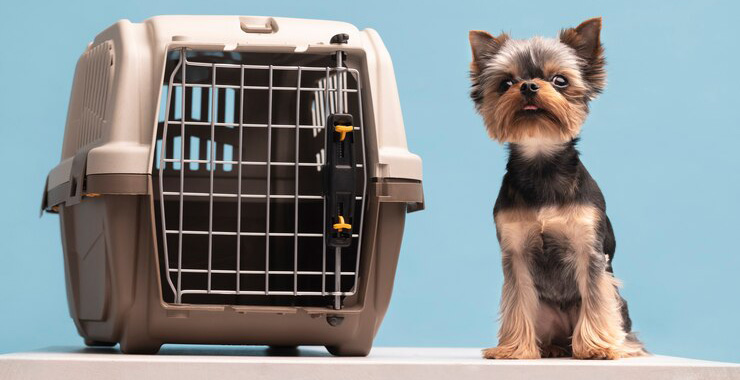Finding the Right Crate Size for Your Dog
One of the simplest ways to make your new puppy feel at home is with a safe, sturdy dog crate. The right crate not only creates a safe place to contain your pet when you can’t be there, but it also taps into a dog’s natural instinct to den. Most dogs love having a place of their own and may retreat to their crate anytime they need a little “me” time. As a bonus, crates usually make housetraining a lot easier by giving your dog a space in your home that is exclusively “theirs”!

How to Measure for a Dog Crate
To measure your pup for a dog crate size, you’ll need two measurements—length and height. With your dog standing up, measure their length from the tip of their nose to the base of their tail. Next, with your dog sitting, measure their height from the top of their head down their front legs to the floor. Add 4 inches to each measurement to find the ideal crate dimensions.
Having the right size dog crate allows your pup to comfortably lie down, turn around and sit or stand as they please. You want your dog to get to know their crate as a place they enjoy spending time in, so making it as comfortable as possible is important. If you’re choosing a crate for your puppy, remember that they will need a larger crate as they grow. You can also use their expected adult measurements to determine the crate size you buy or choose a crate with a divider that can grow as your dog does.

One size doesn’t fit all
While there are many dog crate sizes available to consider, picking the right one for your pet is crucial to ensuring a positive experience from day one. Too little space to move will leave your pup feeling cramped and uncomfortable; while too much space opens the possibility of accidents in the crate. The right dog crate size for your pup will allow them to comfortably stand, turn around, and lie down.
Our pet experts have exhausted miles of measuring tape on pups of all sizes to develop this handy chart to help you determine what size crate is the right fit for your dog:
Dog Crate Sizing Chart

The ‘Dog Weight’ and ‘Common Breeds’ in this chart are provided as helpful guides, but it’s important to measure your dog before choosing a crate so you can fit their unique characteristics. Exact dog crate sizing can vary slightly between specific crates, so be sure to check the dimensions listed on the product’s page before buying. And once you have the right size dog crate, you can use those dimensions to find the perfect dog crate mat to make it cozy and comfortable.
Quick Dog Crate Sizing tips
How they measure up. Remember they need enough space to be able to stand up, turn around and lie down in the crate. We recommend measuring the length from their nose to the base of their tail, then add between 2-4 inches.
Room to grow. If you have a puppy, get a crate that fits their estimated adult size and use a divider to adjust the inside space as they get bigger.
Avoid too much space. Picking up an extra-large dog crate for your medium-sized pup might seem like a nice way to treat them, but having that much space to roam could lead to accidents, especially if they’re still getting used to the crate.
A place to call home. You can help your pup adjust to their new surroundings by adding items like their favorite dog toy or blanket to the crate. Accessories like a cushy crate pad or mat can help provide additional comforts to ease them into a more den-like environment.
Types of Dog Crates
- Wire crates are collapsible for easy transport and storage. This type of crate allows good airflow for pets with long coats or those who live in warmer climates. These are also extremely sturdy and hold up well against chewers.
- Plastic crates feature a sturdy and durable material. Plastic crates can be ideal for families who travel often, as many plastic crates are designed to meet airline requirements.
- Soft-sided crates work well for small breed dogs or puppies accustomed to being in a crate. The lightweight and flexible materials make this crate easy to set up and tear down. These are also handy for transporting your dog to the vet.
- Wooden crates are a more stylish option. They are available in various designs that you can integrate into your home décor as a permanent crate.
IMPORTANT TIPS & TRICKS
- Make sure they’re microchipped
- Check your veterinarian
- Right kennel according to pet size
- Proper documents
- Flight booking
- Comfy environment during flight
1. Invoices
2. Packing List
3. Health Certificates
4. Certificate of origin
5. Awb, Bill of lading
6. Bayan paper
7. Import Permits
- Using a relocation agent
- Timeframes for vaccines
- The validity of the certificates and documents issued for relocation purpose.
- Restrictions of pets from designated country
· Pets should be microchipped.
· Pets must receive vaccinations against rabies and other contagious diseases. For dogs, necessary vaccinations include distemper, hepatitis, parvovirus, and leptospirosis.
· Cats should be vaccinated against panleukopenia, rhinotracheitis, and calicivirus.
· Blood test not required to enter Lebanon.
· The pet owner needs to furnish a health certificate issued by licensed veterinarian.
· IATA Cages
· Health certificate
· Certificate of origin
· Invoice
· Cites for bird under cites list.
· Import permits from Lebanon
· IATA Cages.
RESTRICTIONS
Check all the restriction points
American Bully, American Pitbull, American Staffordshire Bull Terrier, American Bulldog, Anatolian Shepherd dog, Bandog Tosa Inu, Boerboel breeds, Boxer, Bull Terrier, Caucasian (all breeds), Chow-Chow, Doberman Pinschers, Dogue De Bordeaux, pit Bull (all breeds), Staffordshire (all Breeds), Staffordshire Terrier, Cane Corso, Fila Brazileiros, Karabash (Aka Kangal), Mastiff (all Breeds), Presa Canario, Rottweiler, Shar-Pei, Dogo Argentino, Tosa, Wolf Dog.
Affenpinscher, Boston Terrier, Brussels Griffon (Petite Brabncon), Cavalier King Charles spaniel, English cocker spaniel, English Toy Spaniel, French Bulldog, French terrier, Japanese Chin (Japanese Spaniel), Lhasa Apso, Pekingese, Pugs (All Breeds), Shih Tzu, Small Brabant, Tibetan Spaniel
British Shorthair, Birman, Burmese, Exotic Shorthair, Himalayan, Persian, Scottish Fold


